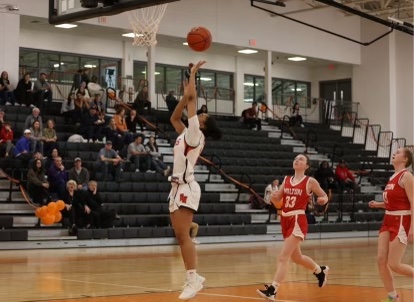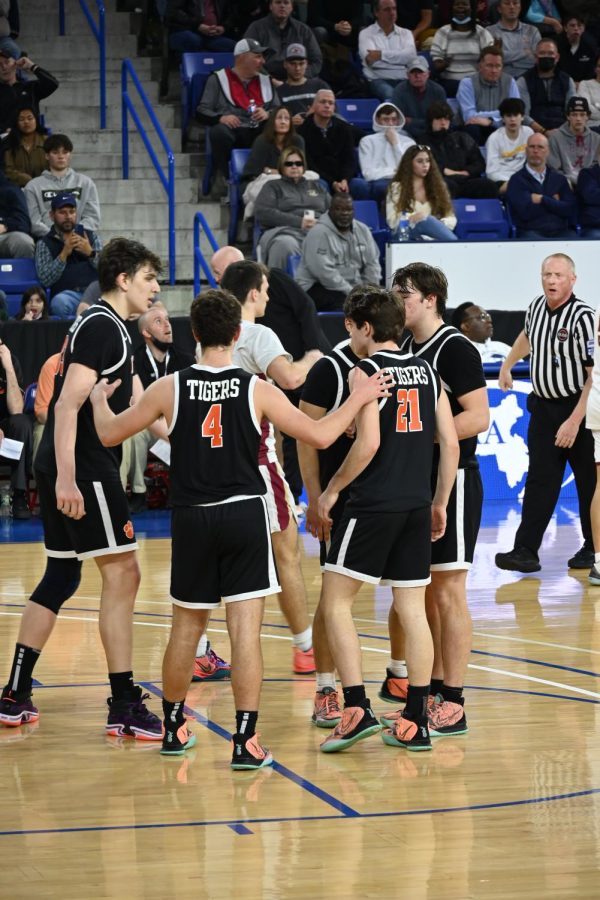
Choosing a college: College counselor Sarah Hoffman helps senior Patse Muumba with the first steps in the college process. Photo taken by Paulina Romero.
by Elena Schwartz
As the school year picks up again, so does the accompanying stress. And for many juniors and seniors, ordinary pressures of homework and tests are supplemented by college worries: applications to write, SATs and ACTs to take, and acceptance (or rejection) letters to await.
However, once this process is complete and acceptance letters have been received, how do students decide where to actually spend the next four years?
The Obama Administration is currently developing a way to gauge the value of schools, estimated to be completed before the 2015 school year. However, at least until then, students will have to decide value on their own.
Important factors worth considering include location, sports, and student body size, to name a few. But two other factors often come into play: the price and the prestige.
Price and Prestige
Prestige has always played a large role in a student’s decision. People want to attend a college that others deem “a good school.”
But as the cost of college rises, this choice becomes complicated. Is it better to attend a less expensive school that is also less prestigious, or to choose a brand-name college and commit to a tight wallet, and in some cases, crippling loans?
According to CNN, the cost of tuition alone at a public university rose 4.8 percent to $8,655 in 2012. At four-year private schools, tuition fees climbed 4.2 percent to an average of $29,056. Add to this the cost of room, board, and books, and the cost is even greater.
Gilad Seckler ’13, who is attending Brown this fall, said that he had predetermined “a threshold” of the maximum tuition cost he would pay.
“Anything above that threshold is too expensive and not affordable,” he explained.
Seckler continued, “Prestige, on the other hand is more of a gradient. Again, there is a certain level it would be nice not to go below, but there is still a difference in my mind between a good school and a great school.”
College counselor Brad MacGowan warned students not to disregard the importance of price.
“It’s very important that students look at financial award letters next to each other to see realistically what college is going to cost,” he said.
“The way price affects a student’s decision differs from family to family. Families should keep in mind how many kids they have and how many student bills they will be paying.”
“A family needs to sit down and talk about these things,” MacGowan said. “How much debt will you come out with? Is it worth it to be in debt? If a family needs to make a big sacrifice, is that worth it?
“You might be willing to take on some debt, but how much debt is too much? And if you’re planning on going to graduate school, you need money for that, too.”
Senior Rachel Brown also noted the importance of “looking to the future” and considering whether it is necessary to save for education beyond college. Money matters might take precedence over prestige if students plan on attending graduate school, which can cost as much as, if not more than, four years of undergraduate college.
“It is important to think about price because now the job market is more competitive, and graduate school is becoming necessary for more careers,” Brown said.
It is also necessary for students to consider the kind of life they want after graduation. Specifically, the concern is whether the career they intend to pursue is a career with a salary that will support student loan payments. If not, then it makes less sense to attend an expensive school that will leave students in debt they cannot repay.
Still, debt has not deterred students in the past from attending schools well out of their price range because they prioritize going to an elite school over making a purely financial choice.
Newton’s Attitude Toward Prestige
Both Seckler and Caroline Ayinon ’13, who is attending Yale this fall, similarly said that the culture in Newton places a greater emphasis on attending a prestigious college, regardless of price.
“I definitely think that students in Newton are more likely to apply to such prestigious schools,” Ayinon said. “And because families here place such a great value on education, I think they would be more willing to do everything they can to allow kids to attend the schools of their choice.”
Senior Evie Heffernan said, “Newton creates an environment in which the college a student attends assigns a value to that person.
“Based on their colleges, students seem to determine their superiority or inferiority in relation to their peers without considering the factors that led them to choose the colleges they did.”
This pressure to attend an elite college can create a “judgemental and competitive” atmosphere, according to senior Sunny Lehman.
“I know people who feel uncomfortable when others talk about the Ivies that they’re applying to because they can only afford state schools,” she said. “People still do make stereotypes about people being ‘too dumb’ to go to Ivies and so they only go to state schools even though it’s primarily a financial reason. It’s unnecessarily judgmental and competitive.”
But is this trade off between price and prestige even worth it? Economists are not so sure. “Measuring College Prestige vs. Cost of Enrollment,” a New York Times article about the value of a degree from an elite college, cites two studies, one focusing on people who graduated in the 1970s and another examining more recent graduates:
“Alan B. Krueger, then an economist at Princeton University, and Stacy Berg Dale, a senior researcher at Mathematica Policy Research, found that equally smart students had about the same earnings whether or not they went to top-tier colleges.
“The big difference, their studies found, came from minority and low-income students who went to top-tier colleges: they did better later on.”
MacGowan cautioned students against prioritizing a school’s rank above all else.
“Students should go to the school that is the best fit for them,” he said. “When you look at rankings, you’re seeing a rank based on someone else’s criteria. You should judge a school by your own standards. Ask yourself, ‘Do I fit in? Could I see myself here?’ Don’t go by what others say.”
“We tend to think of certain colleges as better than others, and though this is a factor in students’ decisions, it shouldn’t be an overwhelming one,” he continued. “The beauty of higher education in America is that there are so many different schools that are each good in their own way.”
Breaking News
- February 1Foreign exchange program departures set to proceed on schedule amid teacher strike
- February 1Teacher strike reaches two full weeks as contract negotiations continue to progress
- January 31Newton parent files lawsuit against NTA amid prolonged strike
- January 31Committee anticipates new union proposal on thirteenth day of strike
- January 30Rejected contract proposals prolong negotiations amid ongoing teacher strike
- January 28School days in jeopardy as contract negotiations continue, NTA compromise package awaits approval
- January 25Teachers strike marks seventh day with progress in ongoing negotiations
- January 25Controversy surrounds NPS instagram posts criticizing teachers’ strike
- January 25Congresswoman Ayanna Pressley supports Newton Teachers Association in urgent call for education funding
- January 23Teachers continue strike amid fines and ongoing negotiations
TOP POSTS
- Wrestling Head coach John Staulo honored with induction into New England Hall of Fame after 27 years of coaching at North
- North's jazz ensemble strikes gold at MAJE regional festival
- Art Major IV students paint new generation of murals
- Winter varsity dance team shines at UDA nationals despite budget cuts
- New cafeteria lunch containers help make North more sustainable
- Boys hockey falls to Weymouth at annual senior night
- Chicago brings the roaring 20s to Lasker Auditorium
- Improv Jam provides the audience with a top-tier experience interacting with the show
- Sophomore speeches showcase variety of underrepresented topics
- Mean Girls Adaptation Lacks Spark of Original Movie
























































